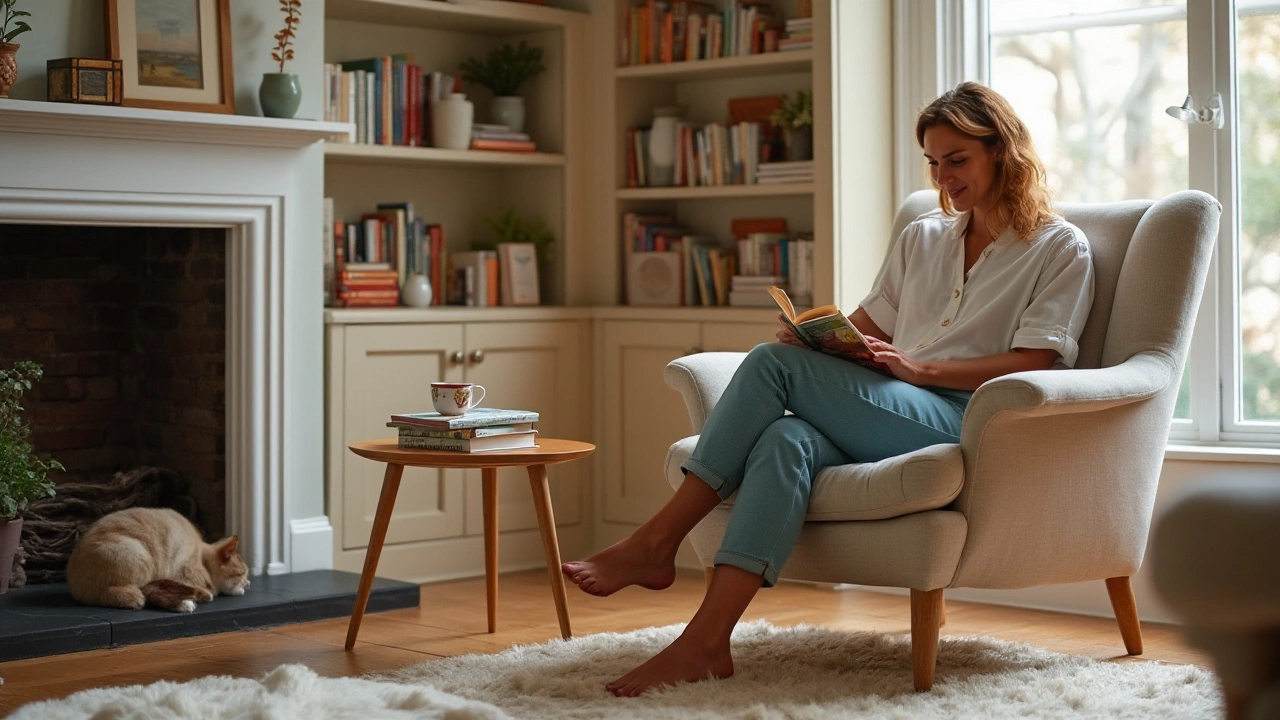Health anxiety can be a debilitating experience, where the fear of illness overtakes one's daily life. It can manifest in myriad ways—frequent doctor visits, constant self-checking for symptoms, and the overwhelming sense of dread that something is catastrophically wrong with one's health. This anxiety can be corrosive, impacting not just mental well-being but also physical health and social relationships.
However, there's a potent tool that many might overlook: positive thinking. The power of the mind is profound. Harnessing a positive outlook can foster resilience, improve coping mechanisms, and diminish the burdens of health anxiety. Not just a buzzword, positive thinking has tangible effects that are grounded in science and real-life experiences.
In this article, we will explore various facets of health anxiety and how adopting a positive mindset can be transformative. We will look into the science behind it, share practical tips that you can start applying today and even dive into some inspiring success stories. By the end, you may find yourself equipped with new tools to combat health anxiety and lead a healthier, more optimistic life.
- Understanding Health Anxiety
- The Science Behind Positive Thinking
- Practical Tips for Positive Thinking
- Case Studies and Success Stories
- Resources and Further Reading
Understanding Health Anxiety
Health anxiety, often referred to as hypochondria, is when people worry excessively about having or developing a serious illness. This concern is often persistent, even when medical tests show no cause for concern. It's estimated that nearly 4-5% of the population experiences health anxiety at some point in their lives. This may seem like a small number, but the impact on the affected individuals is profound. They often find themselves caught in a cycle of worry that can be challenging to break.
During such episodes, a rise in anxiety often occurs around routine bodily sensations. Normal occurrences such as a headache or a minor rash can be blown out of proportion. This relentless fear can lead individuals to frequently visit doctors, often requesting multiple tests. Ironically, the more tests come back negative, the more some might feel their suspicions are confirmed, thinking, “They must have missed something.” This creates a vicious cycle of worry and reassurance seeking.
A fascinating aspect of health anxiety is its connection to past experiences. Many individuals with health anxiety have had family members with serious illnesses. These personal experiences can deeply influence one's perception of their bodily health, creating a heightened state of vigilance. Comparably, the onslaught of medical information readily available online doesn’t help. Websites and social media platforms can amplify fears, making minor symptoms seem like signs of severe diseases.
Health anxiety frequently walks hand in hand with other forms of anxiety and stress. Suppose someone is already prone to anxiety or has generalized anxiety disorder. In that case, they might be more susceptible to fixating on health concerns. The body-mind connection is powerful, and mental stress can manifest in physical symptoms, which in turn fuels more health anxiety.
The British Journal of General Practice notes, "Patients with health anxiety often use the Internet to seek reassurance about their health, yet this habit can paradoxically increase their anxiety levels."
From a biological perspective, anxiety disorders, including health anxiety, can be traced to imbalances in brain chemicals like serotonin and dopamine. These neurotransmitters are essential for regulating mood and anxiety. When they are out of sync, mood disorders and anxiety-related conditions can emerge. This is why some treatment plans might include medication to help balance these chemicals.
Given the complexity of health anxiety, it is essential to recognize the signs early. Common indicators include constant self-examination and self-diagnosis, fearing ordinary physiological functions, and seeking reassurance frequently. Understanding these signs can be pivotal in seeking appropriate help and curbing the anxiety before it snowballs into something more severe.
As we delve further into this article, keep in mind that you're not alone in this struggle. Knowledge and understanding are the first steps towards managing health anxiety effectively. As we move on to the science behind the power of positive thinking, consider how your current mindset may be shaping your experience with health anxiety. With the right strategies and support, it is entirely possible to regain control and improve your quality of life.
The Science Behind Positive Thinking
Positive thinking isn’t just a feel-good fad; it has deep roots in scientific research. Studies from renowned institutions across the globe have shown how adopting a positive mindset can significantly impact mental health and anxiety relief. Cognitive behavioral therapy (CBT), for instance, heavily relies on altering negative thought patterns into positive ones to treat various forms of anxiety, including health anxiety.
The brain controls our bodies in ways we’re only beginning to understand. Neuroplasticity, the brain's ability to reorganize itself by forming new neural connections, is one key player in this. When you constantly dwell on negative thoughts, you reinforce those pathways in the brain. On the flip side, fostering positive thoughts can create new, beneficial neural patterns that impact your mood and behavior.
One study from the University of Kansas revealed that smiling, even a forced smile, can reduce heart rate and blood pressure during times of stress. This is because positive emotions release dopamine and serotonin, which are the body’s natural mood boosters. This change in chemistry helps mitigate the effects of stress and anxiety, further proving that our mental state plays an essential role in our physical health.
"The mind is everything. What you think you become." — Buddha
Dr. Barbara Fredrickson, a leading researcher in positive psychology, developed the Broaden-and-Build Theory, which posits that positive emotions broaden one's awareness and encourage novel, varied, and exploratory thoughts and behaviors. This broadening effect helps build resources that contribute to health and well-being. In essence, positive emotions open us up to more possibilities and choices, enabling us to deal better with stressors like health anxiety.
Moreover, positive thinking also impacts the immune system. Research published in the journal Psychosomatic Medicine indicated that individuals with a positive outlook had better immune responses compared to those who viewed life negatively. It found that even during stressful times, maintaining a positive attitude helped sustain a stronger immune function.
While the scientific community continues to discover more about the intricate relationships between thought patterns and physical health, existing evidence strongly supports the benefits of positive thinking. This form of mental conditioning doesn’t just fight anxiety but also contributes to overall wellness.
So, the next time you find yourself spiraling into a cycle of health anxiety, pause and consider the science. Start practicing positive thinking techniques, such as mindfulness, gratitude journaling, and visualization. It won't happen overnight, but with persistence, you can rewire your brain to support a healthier, more optimistic outlook.

Practical Tips for Positive Thinking
Adopting a positive mindset can be a powerful way to counteract health anxiety. By making a few simple changes in daily habits and thoughts, individuals can shift their perspective and improve their mental health. Let’s dive into some practical tips that can help foster positive thinking.
One effective method is practicing gratitude. Taking a few minutes each day to reflect on things you are thankful for can help to shift focus from anxiety-inducing thoughts to more positive ones. It might be as simple as appreciating the sunshine, a friendly conversation, or a delicious meal. Writing these down in a journal can amplify the benefits, making it easier to revisit these moments of gratitude when negativity creeps in.
Another useful habit is incorporating mindfulness and meditation into your daily routine. Mindfulness helps ground you in the present moment, reducing the tendency to dwell on negative thoughts and hypothetical health concerns. Meditation can guide your mind into a calm and balanced state. Even just five to ten minutes of mindfulness practice each day can make a notable difference. Apps like Headspace and Calm offer guided meditations specifically aimed at reducing anxiety.
Physical activity also plays a crucial role in promoting positive thinking. Exercise releases endorphins, which naturally elevate mood and combat stress. Activities like walking, yoga, and biking not only improve physical health but also provide mental clarity and emotional resilience. The key is to find something enjoyable and make it a regular part of your routine.
Surrounding yourself with positive influences is another significant step. Engage with people who uplift you and limit time with those who drain your energy. Positive social interactions can provide emotional support and strengthen your ability to handle stress. Support groups, whether in person or online, can offer a sense of community and shared understanding, which is particularly beneficial for those struggling with health anxiety.
“The greatest weapon against stress is our ability to choose one thought over another.” – William James
Goal setting is another powerful tool in combating health anxiety through positive thinking. Setting achievable, realistic goals provides a sense of purpose and direction. Break down big goals into smaller, manageable tasks, and celebrate each milestone along the way. This focus on progress rather than perfection helps build confidence and reduce anxiety.
Lastly, practicing self-compassion is critical. Treat yourself with the same kindness and understanding that you would offer a friend. Recognize that everyone has moments of weakness and that it's okay to seek help. Being gentle with yourself can greatly reduce the severity of health anxiety and enhance overall well-being.
By incorporating these practical tips into your daily life, you can foster a more positive mindset and effectively combat health anxiety. Remember, the journey towards positive thinking is a gradual process, but with persistence and dedication, significant improvements can be made.
Case Studies and Success Stories
To truly grasp the transformative power of positive thinking on health anxiety, let's delve into some real-world accounts. These stories not only validate our understanding but also offer inspiration and hope to those struggling with similar issues.
Consider the case of Emma, a young professional in her late twenties. Emma's battle with health anxiety began in college when she experienced a severe panic attack. Convinced she had a life-threatening illness, she frequented doctors and specialists, only to receive clean bills of health. The cycle of worry and relief was exhausting. Emma decided to try cognitive-behavioral therapy (CBT) which focuses greatly on positive thinking. Over time, she learned to reframe her thoughts. She went from “I have a headache, I must have a brain tumor” to “Headaches can be caused by many things; stressing will only make it worse.” Today, Emma manages her anxiety far better and feels in control of her life again.
Another inspiring journey comes from John, a middle-aged man who developed severe health anxiety after a minor surgery. Fearing complications, John became obsessed with monitoring his vital signs and consumed by the dread of medical errors. He turned to mindfulness-based stress reduction (MBSR), a program that integrates meditation and positive thinking. Through classes and daily practice, John learned to stay present and not let his mind spiral into worst-case scenarios. His success is also supported by scientists; a study from Johns Hopkins University found that programs like MBSR can significantly reduce anxiety symptoms.
One more remarkable story is that of Sarah. As a healthcare worker, she was constantly exposed to information about new diseases, feeding her health anxiety. Sarah took advice from a mentor and began keeping a gratitude journal. By jotting down positive occurrences and thoughts each day, she shifted her focus from fears to things she could appreciate. This simple habit transformed her outlook, reducing her anxiety levels dramatically.
It’s also worth noting some statistics. According to a study published by the National Institute of Mental Health, 40% of participants who practiced positive thinking reported a significant decrease in anxiety. The effects of positive thinking are not just anecdotal; they are backed by research and data.
The famed psychologist Dr. Martin Seligman once said, “Optimism is invaluable for the meaningful life. With a positive mindset, you cannot fail; you may bring in negative results, but that is not failure, it is just another stepping stone to success.”The positive impact of such an approach can be life-changing, and these cases offer testament to that fact.

Resources and Further Reading
Tackling health anxiety can feel daunting, but there are countless resources available to guide you along the way. Books, online courses, support groups, and reputable websites are terrific starting points for anyone looking to gain more in-depth knowledge and practical advice. Let's dive into some of the most helpful and well-regarded resources that you can explore at your own pace.
If books are your go-to for self-improvement, consider titles like “The Worry Trick” by David A. Carbonell, which offers practical steps to disengage from the cycle of worry. Carbonell's book is based on cognitive-behavioral techniques and provides actionable advice. Another excellent read is “Self-Coaching: The Powerful Program to Beat Anxiety and Depression” by Joseph Luciani. Luciani teaches assertive ways to deal with anxiety without the overwhelming jargon.
Online courses can also be immensely beneficial. Websites like Coursera and Udemy offer courses focused on mental health and anxiety management. For instance, the Science of Well-Being course by Yale is a great place to start, not only to tackle anxiety but to boost your overall mental resilience. These courses are often flexible, meaning you can learn at your own pace and revisit complex topics as needed.
According to the American Psychological Association, “Positive thinking shapes the way we process information and makes us more resilient against stress.”
Support groups provide a sense of community and understanding that can be incredibly therapeutic. Platforms like Meetup have groups specifically for people dealing with health anxiety. These groups offer a safe space to share experiences, exchange coping strategies, and provide moral support. Online forums such as Reddit also have communities like r/HealthAnxiety where people from across the globe share their journeys and coping mechanisms.
When it comes to reputable websites, the Mayo Clinic and National Institute of Mental Health (NIMH) offer extensive research-backed articles and practical tips for managing anxiety. These sites provide not only self-help techniques but also information on when it's necessary to seek professional help. They offer a plethora of articles, from relaxation techniques to the latest scientific research on anxiety disorders.
Professional Help
While self-help resources are valuable, there are times when professional guidance is essential. Cognitive Behavioral Therapy (CBT) has been shown to be highly effective in treating health anxiety. Finding a licensed therapist who specializes in anxiety disorders can provide a structured and personalized approach to your treatment. Websites like Psychology Today have directories of licensed professionals in various locations.
For those who prefer instant guidance, consider apps like Headspace or Calm. They offer guided meditations and mindfulness exercises that have been shown to reduce anxiety levels. Telehealth options are also increasingly available, making it easier than ever to consult with a mental health professional from the comfort of your home.
Remember, you are not alone in your journey to manage health anxiety. Leveraging a mix of self-help resources and professional advice can set you on a path toward a more peaceful, healthier state of mind.





